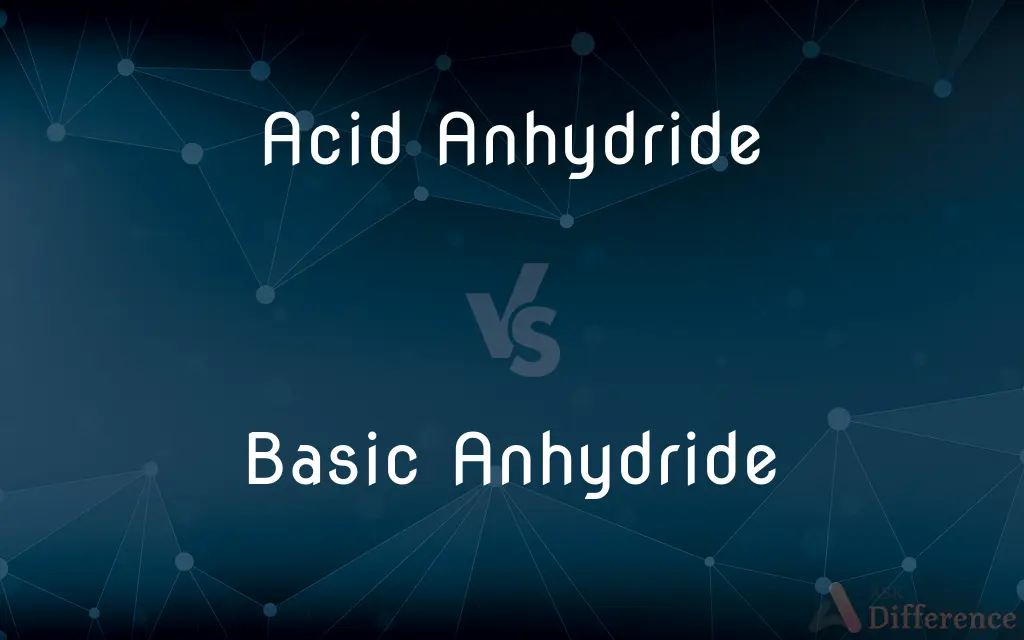Acid Anhydride vs. Basic Anhydride — What's the Difference?
By Tayyaba Rehman — Published on December 14, 2023
Acid Anhydride is a non-metal oxide that forms an acid when reacted with water, while Basic Anhydride is a metal oxide that forms a base in the presence of water.

Difference Between Acid Anhydride and Basic Anhydride
Table of Contents
ADVERTISEMENT
Key Differences
Acid Anhydride is an oxide that, when combined with water, produces an acid. These compounds are typically derived from non-metals and can react with bases. On the contrary, Basic Anhydride refers to oxides that, upon addition to water, yield a base. These are typically derived from metals and can react with acids.
Acid Anhydride is essential in organic chemistry, particularly in synthesizing various organic compounds. They can be seen in the formation of esters and amides. Basic Anhydride, in contrast, plays a role mainly in inorganic chemistry, especially when working with metallic compounds and producing hydroxides upon hydration.
The properties of Acid Anhydride align closely with those of acids; for instance, they can participate in typical acid-base reactions. Basic Anhydride, mirroring the properties of bases, can neutralize acids to produce salt and water, acting as a fundamental agent in such reactions.
Safety is crucial when handling both types. Acid Anhydride can be corrosive and can cause burns if in contact with the skin, while Basic Anhydride can be caustic, posing risks if not dealt with caution.
Comparison Chart
Origin
Derived from non-metals.
Derived from metals.
ADVERTISEMENT
Reaction with Water
Forms an acid.
Forms a base.
Common Role in Chemistry
Used in organic synthesis.
Commonly involved in inorganic reactions.
Interaction with Bases
Can react with bases.
Can neutralize acids to produce salt and water.
Safety Concerns
Can be corrosive.
Can be caustic.
Compare with Definitions
Acid Anhydride
Can be hazardous due to its corrosive nature.
Safety precautions are necessary when working with acid anhydrides in the lab.
Basic Anhydride
Typically derived from metallic elements.
Magnesium oxide is a basic anhydride originating from the metal magnesium.
Acid Anhydride
An oxide that forms acid when hydrated.
Acetic anhydride, when added to water, produces acetic acid.
Basic Anhydride
Predominantly features in inorganic chemistry.
Basic anhydrides are central in reactions forming metal hydroxides.
Acid Anhydride
A compound derived typically from non-metals.
Sulfur trioxide is an acid anhydride that forms sulfuric acid upon hydration.
Basic Anhydride
An oxide that yields a base upon hydration.
Calcium oxide is a basic anhydride that produces calcium hydroxide with water.
Acid Anhydride
Essential in organic synthesis.
Acid anhydrides are crucial in esterification reactions in organic chemistry.
Basic Anhydride
Neutralizes acids to produce salt and water.
A basic anhydride can react with acids in neutralization reactions.
Acid Anhydride
Can undergo typical acid-base reactions.
An acid anhydride can neutralize bases, similar to how acids function.
Basic Anhydride
Caution is advised due to its caustic nature.
It's essential to handle basic anhydrides with care to avoid chemical burns.
Common Curiosities
Can Acid Anhydride neutralize bases?
Yes, Acid Anhydride can react with bases in a manner akin to typical acids.
How does Basic Anhydride differ?
Basic Anhydride is an oxide that yields a base when mixed with water.
What is the primary role of Basic Anhydride in chemistry?
Basic Anhydride is key in inorganic chemistry, especially in producing metal hydroxides.
Are Acid Anhydrides typically corrosive?
Yes, many Acid Anhydrides can be corrosive and need cautious handling.
Can Basic Anhydride react with acids?
Absolutely, Basic Anhydride can neutralize acids to produce salt and water.
What happens when Basic Anhydride reacts with water?
A base is formed when Basic Anhydride is added to water.
In which type of reactions is Acid Anhydride frequently used?
Acid Anhydride is often used in organic synthesis, like forming esters and amides.
Are Basic Anhydrides always solids?
While many are solids, like calcium oxide, not all Basic Anhydrides are necessarily solid.
Are Basic Anhydrides safe to handle?
Basic Anhydrides can be caustic; hence, safety precautions are essential.
What is Acid Anhydride?
Acid Anhydride is an oxide that forms an acid when combined with water.
From what are Basic Anhydrides generally derived?
Basic Anhydrides are usually derived from metals.
How are Acid Anhydrides named in organic chemistry?
In organic chemistry, Acid Anhydrides are often named based on the acid they can form.
12. Can Acid Anhydrides be found naturally?
Yes, some Acid Anhydrides, like sulfur trioxide, occur naturally.
How do Acid and Basic Anhydrides differ in terms of origin?
Acid Anhydrides typically come from non-metals, while Basic Anhydrides are derived from metals.
Are all Acid Anhydrides used in organic chemistry?
While many are, not every Acid Anhydride is used exclusively in organic reactions.
Share Your Discovery

Previous Comparison
Forensic Science vs. Criminology
Next Comparison
Ascorbic Acid vs. Sodium AscorbateAuthor Spotlight
Written by
Tayyaba RehmanTayyaba Rehman is a distinguished writer, currently serving as a primary contributor to askdifference.com. As a researcher in semantics and etymology, Tayyaba's passion for the complexity of languages and their distinctions has found a perfect home on the platform. Tayyaba delves into the intricacies of language, distinguishing between commonly confused words and phrases, thereby providing clarity for readers worldwide.
















































